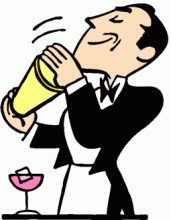There's a lot that goes into the overall quality of a bar. A good selection of bottles, a menu of stone classics and special innovations, careful decor, music type and volume, and regular clientele are all important factors, to be sure. But the hands behind the bar are what really determine if a particular watering hole is worth repeat visits. A deft mixologist can elevate a dive to a hidden gem and make a fancy retreat earn its high prices. The truth is that, in any given city, there are maybe a handful of great bartenders, if that. It's sad to think that there are decent-sized cities sorely lacking in true liquor artists, but them's the breaks. If you're lucky enough to live in a town with one of the elite, here's how to spot him or her.
While personality goes a long way to establishing a great bartender, the work is where it really counts. Before getting friendly or putting your trust in a bartender, evaluate him or her with a test drink. A good test drink is a cocktail that requires a little bit of uncommon knowledge without being too obscure, the kind of drink a liquor enthusiast would definitely know but the average beer-puller won't. A test drink shouldn't be too complex, either. You're not just using it to discern your bartender's knowledge, you're also using it as a chance to test care and execution. Something with subtle flavors like the Vesper or nuances of proportion like the Old Fashioned are perfect test drinks. They'll force your bartender to make important decisions about what particular brands to use, what techniques to employ and how to present the final product. There'll be no doubt in the flavor of your test drink. Even if it's not the way you make it at home, if it has something intriguing and pleasant about it, you know you're in capable hands.
When it comes to the particulars beyond simple ability, there's no one-type-fits-all kind of bartender. Personally, I prefer my keeps to be clean and exacting in their approach. Nothing pushes me away from a bartender like watching a sloppy pour or seeing a drink sit in the shaker unattended and thus diluting. That said, the kinds of drinks I tend to order definitely suffer from a fast and loose approach. You may prefer speed over precision or a keen memory for your "usual", so pay attention to your bartender's style while he or she is serving other patrons. And if you can't watch your bartender work, you're at the wrong bar to begin with.
Still, all of the above is just a prelude. The difference between a great bartender and one who is merely good is that, in addition to skill and personality, he or she can introduce you to new things. A truly trustworthy keep is one who can build you something according to your mood upon request. If you can ask for something warm and comforting, then see a special-recipe Hot Toddy with unusual but welcome ingredients like apple brandy and peach bitters, you've got yourself a real friend behind the bar. This is the same kind of bartender who notifies you of new, interesting bottles in stock, is happy to open your eyes to an unusual aperitif and is quick to offer variations on a drink just in case you've got a taste for something different.
Once you've found your great bartender, send that care right back by being an ideal patron. Tip generously, don't monopolize his or her time, don't drink too much on his or her shift and bring your friends along. A top-tier bartender, like any true artist, deserves to be nurtured.
